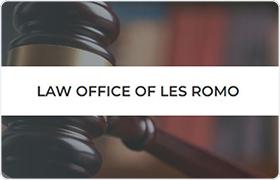Temple Real Estate Lawyer, Texas
Sponsored Law Firm
-
 x
x

Click For More Info:
-
Law Office of Les Romo
102 West Morrow Street Suite 202 Georgetown, TX 78627» view mapEstate Law Helping You Understand Your Options
Attorney Les Romo can help protect your interests and resolve your legal issue in the best possible way. Attorney Romo is dedicated to vigorously representing his clients.
800-769-7481
Elisabeth C. Llamas
Real Estate, Criminal
Status: In Good Standing *Status is reviewed annually. For latest information visit here
William T. Wilson
Juvenile Law, Estate Planning, Family Law, Commercial Real Estate, Business
Status: In Good Standing *Status is reviewed annually. For latest information visit here Licensed: 55 Years
Thomas C. Baird
Real Estate, Wills & Probate, Trusts, Estate Planning, Merger & Acquisition
Status: In Good Standing *Status is reviewed annually. For latest information visit here
Juli Ann Bryan
Real Estate, Commercial Real Estate
Status: In Good Standing *Status is reviewed annually. For latest information visit here Licensed: 19 Years
Stephen Thomas Brischke
Business & Trade, Gift Taxation, Commercial Real Estate, Tax, Wills
Status: In Good Standing *Status is reviewed annually. For latest information visit here
Marsha L. Schiller-lunde
Credit & Debt, Business & Trade, Wills, Construction, Commercial Real Estate
Status: In Good Standing *Status is reviewed annually. For latest information visit here
James Randolph Secrest
Felony, Wills, Dispute Resolution, Commercial Real Estate
Status: In Good Standing *Status is reviewed annually. For latest information visit here Licensed: 26 Years
John Drew Popelka
Business & Trade, Elder Law, Wills, Commercial Real Estate, Tax
Status: In Good Standing *Status is reviewed annually. For latest information visit here Licensed: 26 Years
Tad E. Allen
Personal Injury, Family Law, Wills, Commercial Real Estate
Status: In Good Standing *Status is reviewed annually. For latest information visit here Licensed: 12 Years
Joe Michael Russell
Personal Injury, Credit & Debt, Insurance, Litigation, Construction
Status: In Good Standing *Status is reviewed annually. For latest information visit here Licensed: 21 Years
 Les Romo Georgetown, TX
Les Romo Georgetown, TX Practice AreasExpertise
Practice AreasExpertise